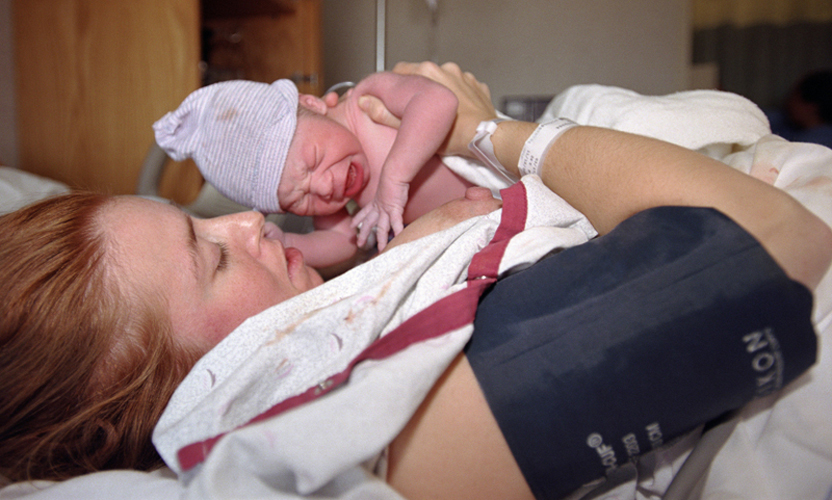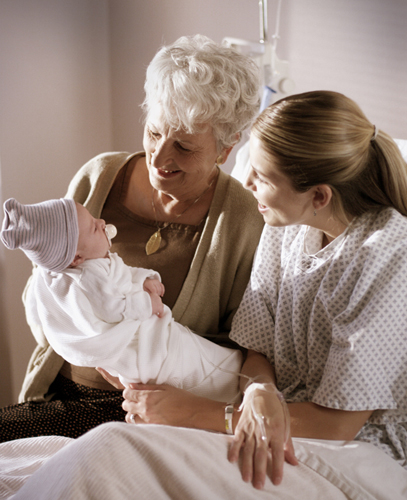The first 12 hours, step by step What to expect after the birth
It's hard to imagine how you
will feel at the start of your life with a new baby. What is more
certain is that you will most likely be exhausted after the birth, and
will probably experience a whole range of emotions, from euphoria at
meeting your new baby and relief that the labor and birth are behind
you, to tearfulness brought on by fatigue and anxiety at the prospect of
caring for this tiny human being. You may feel incredibly protective
toward your baby and overwhelmed by the immense responsibility of taking
care of him. All of these feelings are normal and part of the huge
adjustment you make after having a baby. Here is what to expect in the
first 12 hours.
1. 1–3 hours
Once your baby has been
delivered and if you both are well, you should be able to hold him
immediately and enjoy your first cuddle. The cord will be cut by the
midwife, or by your partner if this was part of your birth plan. After
the birth, you will need to push again to deliver the placenta.
If you had an episiotomy or sustained a laceration during the birth,
you will be given an anesthetic before being stitched. Minutes after the
birth, your baby's condition will be assessed using the Apgar score and, when you are feeling ready to give him up for a minute, he will be weighed, measured, cleaned, and wrapped in a blanket.
If you are planning to
breast-feed, you should be able to put your baby to the breast as soon
as possible; he may root for your nipple right away, or may simply enjoy
being held close to you and having skin-to-skin contact. If you had a
cesarean, you will be moved to a recovery room or back to your own room
after the surgery; once there, the nurse will help position you
comfortably for the first breast-feeding. Also, in the first few hours
after a vaginal birth, you and your partner will be offered something to
eat, which is usually extremely welcome.
The first cuddling:
Holding your baby after the birth is an incredibly precious moment, whether you are feeling exhausted, relieved, or tearful.

2. 4–5 hours
By this stage, you could
be sleeping or you may want to take a bath or shower. You may need to
have someone with you at first if you are feeling unsteady. If you had a
cesarean, you won't be able to shower yet, but the nurse will be able
to help you with a sponge bath. During this time, you'll have your blood
pressure, temperature, pulse, respiration, and uterine, perineal, and
bleeding assessments done frequently for the first 4–6 hours postpartum.
You will also be offered medication to help you deal with any pain.
Although you may be sore after the birth, it's a good idea to start
moving as soon as possible since this will help your recovery by
building your strength and helping your circulation. Movement will also
encourage your bladder and bowel to start working sooner. Urinating
after having stitches can sting, so you may want to try pouring warm
water over the area when you use the bathroom. If you had a cesarean,
moving around will be more difficult, but it is still important to start
to be active to avoid the risk of blood clots from developing.
3. 6–12 hours
Your baby may want to feed and you can practice positioning him at the breast so that he latches on correctly.
The nursing staff will help you get started with breast-feeding. You
may find you experience fairly strong afterpains while feeding as your
uterus contracts down . You should also receive practical advice on how to change your baby's diaper and clean him .
Don't worry if you feel apprehensive about the practical care of your
baby and try not to feel intimidated if you feel clumsy at first; you
will find that your confidence grows quickly as you become practiced at
handling your baby. The nursing staff at the hospital will provide
advice and information on how to care for your baby now and during those
first few weeks at home. They will demonstrate how to take your baby's
temperature, bathe him, care for the umbilicus (and the circumcision if
this was done), comfort him, and swaddle him. Some maternity centers
employ lactation consultants as well. If you are hesitant about any
facet of baby care, don't hesitate to consult your nurse. On the
discharge day, which is generally the second day after the delivery,
you'll get tips on baby care, feeding, rest, and exercise. If you are Rh
negative and your baby is Rh positive, you will receive an injection of
RhoGAM. If you are not immune to Rubella, a vaccination should be
provided. Finally, contraception advice and postpartum warning signs
should be addressed by your midwife or doctor.
Hospital staff will assist you with breast-feeding, helping you
position your baby at the breast so that he can latch on correctly.

Once you're settled on the postpartum ward, you will be able to
receive visitors. Close family, particularly new grandparents, are
usually eager to see the new arrival.
